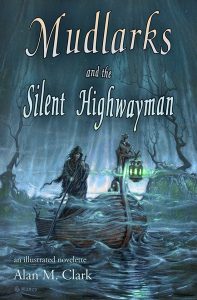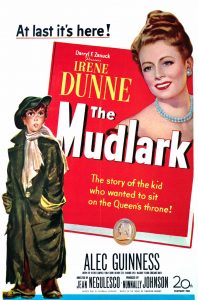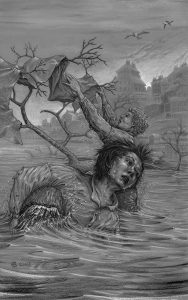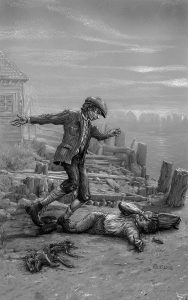Something different now, O best beloved – Victorian life by the Thames, and those who searched the riverbanks to make a living, looking for discarded or abandoned items. With a distinct touch of the supernatural, of course. For it’s our pleasure over the next couple of weeks to take part in the serialisation of Alan M Clark‘s short novella Mudlarks And The Silent Highwayman.
We’ll be posting two segments every two or three days, along with Alan’s extensive range of interior illustrations, created specially for the project – plus the occasional bits of trivia and historical notes.
A HARD LIFE BY THE THAMES
In 1884 London, 12-year-old Albert Gladwyck must decide whether to follow his generous heart or learn to harden it in the harsh world in which he lives. As a River Thames scavenger, he has made the find of a lifetime, a wrecked boat full of goods, washed up on the Isle of Dogs and hidden from view. To save himself and his Mum from severe poverty, he must try to make salvage from the wreck before the other mudlarks find it, before the bully, George Hardly, catches up to him, before illness and death from the poisonous river have a say in the matter.
This lavishly illustrated novelette gives a glimpse into a time when the pauper child was ubiquitous in the city. It is the fanciful tale about the choices a desperate child might make in such an environment to survive.
TRIVIA: Some may already know the term ‘mudlark’ from the 1950 British film The Mudlark (which was actually based on a novel written by an American, Theodore Bonnet).
“A young street urchin (Andrew Ray), half-starved and homeless, finds a cameo containing the likeness of Queen Victoria (Irene Dunne). Not recognizing her, he is told that she is the “mother of all England”. Taking the remark literally, he journeys to Windsor Castle to see her.
“When he is caught by the palace guards, the boy is mistakenly thought to be part of an assassination plot against the Queen. Prime Minister Benjamin Disraeli (Alec Guinness) realises that the boy is innocent and pleads for him in Parliament, delivering a speech that indirectly criticizes the Queen for withdrawing from public life. The Queen is infuriated by the speech, but she is genuinely moved upon meeting the boy for the first time, and once again enters public life.”
“Alan M. Clark has a remarkable ability to evoke the past as a tangible, breathing thing, immersing the reader in times long gone – and thankfully long gone, for most. In this novella, he combines his keen eye for period with a sense of menace and melancholy which yet bears a glimmer of hope. A moving read.”
—John Linwood Grant, author of A Persistence of Geraniums & The Assassin’s Coin
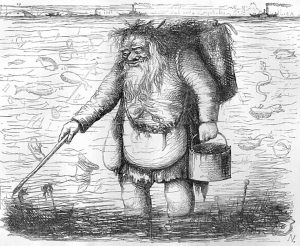 “Dirty Father Thames” Cartoon from Punch Magazine October, 1848
“Dirty Father Thames” Cartoon from Punch Magazine October, 1848
Here’s the poem which accompanied the cartoon:
Filthy river, filthy river,
Foul from London to the Nore,
What art thou but one vast gutter,
One tremendous common shore?
All beside thy sludgy waters,
All beside thy reeking ooze,
Christian folks inhale mephitis,
Which thy bubbly bosom brews.
All her foul abominations
Into thee the City throws;
These pollutions, ever churning,
To and fro thy current flows.
And from thee is brewed our porter –
Thee, thou gully, puddle, sink!
Thou, vile cesspool, art the liquor
Whence is made the beer we drink!
Thou too hast a conservator,
He who fills the civic chair;
Well does he conserve thee, truly,
Does he not, my good Lord Mayor?
MUDLARKS AND THE SILENT HIGHWAYMAN
SEGMENT 1
Limehouse and the Isle of Dogs
October 30, 1884
Half-submerged in the murky River Thames, twelve-year-old Albert Gladwick struggled to keep the fallen tree limb from getting away. His new friend, Turvey, worked to free a long, torn length of blue linen from the branch’s twiggy clutches. If they could free it, they’d earn perhaps three pence selling the fabric. Hugging the limb under his right arm and leaning forward, digging his toes into the mud and grit of the river bottom, Albert fought the current that was trying to drag the heavy branch downstream. Though he did his best to ignore his imagination, he couldn’t help thinking that unseen creatures moved through the water surrounding him.
Turvey leapt again and again to break the twigs holding the cloth, his splashing about so vigorous the foul water’s faint odor of slops rose up around them. Alberts mother, Chelsey, called that smell a pong. “It’s the foul breath of the grundylows, what live in the water,” she’d told him. “Bubbles rising from the river, that’s their breath. It’s how most illness comes into the world. You see that, move swiftly to get away.”
The insistent current pulled Albert upright, then backwards until he lost his footing on the river bottom. Feeling something brush along his right hip, he cried out and let go.
Holding onto the fabric, Turvey leaned back, bracing himself to hang on. Albert twisted around and sloshed forward to lend a hand. He hoped the action took him away from whatever might be after him. Before he could assist his friend, the last few twigs holding the cloth broke away and the limb continued moving downstream.
The water calmer, Albert saw nothing but green-brown light twisting in the current. I don’t believe in Grundylows, he told himself, and turned to the other boy. “You saved us a mad scramble through the water.”
Turvey reeled in the sodden linen. His bad eye bulged from its socket as he grinned.
Albert became aware that the weight of the large canvas sack he routinely carried over his shoulder was missing. Its makeshift strap had been loose. Empty but for a piece of roofing lead he’d found earlier, the sack had surely gone downriver with the branch. Albert cursed his damnable bad luck, then quickly turned away from the thought.
“A good thing one of us can hold fast,” Turvey said with a scoffing laugh.
Though they’d known each other a mere two days, Albert had got used to his friend’s jeering remarks. “Right, I can’t keep a grip on much today—lost my sack in the fight.”
“Serves you right.”
Albert swallowed the insults that collected on his tongue—none of them had been clever enough. A rather earnest child, he wasn’t practiced at the good-natured jibes his friend enjoyed. He’d work on that. In the meantime, all he could do was to take the abuse in stride.
“Badly stained,” Turvey said, “but not much rot.” He shook water from the blue fabric, folded it roughly, and placed it in his own collection sack, which was more of a leather bucket with small holes punched in it to allow liquid to flow out.
The boys slogged their way back to the bank where they’d been sitting when they first spied the cloth in the branch floating by.
MUDLARKS AND THE SILENT HIGHWAYMAN
SEGMENT 2
“Since we both spotted the cloth about the same time,” Albert said, “it’s only fair we share what it earns.”
“You did your best, I suppose,” Turvey said with a smirk.
Despite the loss of the canvas sack, Albert had enjoyed having the help and the companionship, something he rarely had in scavenging. “What if we got the others—all of us scavengers—to search the river together, then shared the profits of what we found? We’d do better than we each do alone, guarding our secrets.”
Turvey screwed up his face, glared at Albert with his one good eye. “Start with that and you’ll see Hardly’s family taking charge,” he said. “Our freedom will be gone. There’ll be those seeking favor and we’ll end up with quotas hard to meet. That’s what the guttersnipes as run with kidsmen suffer. You want to go up against George Hardly, or worse, each day?”
George Hardly caused no end of trouble along the north bank near Limehouse. He was tall for his thirteen years, skeletally thin, yet strong; a cruel boy with a burn scar making a knotty burl out of the cheek on the right side of his face. Stories went about that his father, a tosher and bone grubber, regularly beat him with a leather strap, and had disfigured the boy’s face while in a drunken rage.
A week earlier, Hardly had snuck up on Albert, swept his legs out from under him, kicked him in the gut, and taken a modest find: the half-rotten remains of a mongrel. Unable to get up, Albert had writhed in pain in the sand and gravel. Hardly leaned over him, put his scowling, scarred face too close to Albert’s. “Won’t be long,” he growled, “you want to search this part of the river, you’ll all be working for me. I’ll get a piece of everything you and the others find.”
Albert kept a wary eye out to avoid further contact with the bully boy. Just the day before, he’d experienced a withering feeling in his gut—an echo of the pain the older boy had inflicted—as Hardly’s eyes found him from some distance away along the foreshore. Engaged in threatening another boy at the time, the bully hadn’t followed as Albert fled, climbing the bank toward the street.
Hardly did not own that part of the river yet, but it seemed only a matter of time before he did. He had older brothers who plundered barges in the night and sold the stolen goods through local family people.
“No,” Turvey continued, “we’re better off going our separate ways so the Hardly’s can’t keep up.” He pulled the blue linen cloth from his leather bucket, spread it out, and folded it in half more carefully.
Albert could see what he meant, and nodded his agreement, yet that must not have been enough.
“You have some foolish notions,” Turvey said, pulling out a clasp knife.
Albert stepped back, thinking he’d lost his share of the cloth and his new friend.
“Goodwill is fine for the well-to-do,” Turvey said. “I need a mate what’s hard enough to defend his own.” He cut the cloth with the knife along the fold, handed one half to Albert, then turned and walked off with the other.
Dumbfounded, yet relieved their disagreement hadn’t come to blows or worse, Albert watched him go. Then outrage made him call out, “We’d’ve got more selling it in one piece.”
Turvey didn’t respond.
I’d have done better to insult him more.
Friends and loyalties were difficult on the banks of the Thames. Mostly boys between the ages of seven and fifteen, the Mudlarks were secretive creatures protecting territories, each a solitary sort of child. Like Albert, they were from families one step away from destitution. All the children he knew did some sort of work to contribute income to their family households. Even the children fortunate enough to go to the Ragged Schools did some sort of piecework at night. Among such poor children on the river banks, the competition, good-natured or otherwise, was to be expected.
I should harden my heart if I want more friends, he thought. The idea seemed to go against an effort to find and keep companions, but he decided he’d have to consider it even so.
Albert expected he wouldn’t be speaking or spending time with Turvey again for a long while. Already within the year, he’d lost two good friends to fever. A familiar loneliness grew in his breast.
Segments 3 and 4 follow in a couple of days. You can also see the story unfold daily here:
https://ifdpublishing.com/blog/f/mudlarks-and-the-silent-highwayman
The entire book, illustrated throughout by Alan, is available now on Amazon, and directly from the publisher through the links below:
mudlark ebook – ifd publishing
mudlark paperback – ifd publishing
Should you care for more than just a touch of the unnatural in the same period, John Linwood Grant’s novel The Assassin’s Coin, featuring the fearful Mr Dry and the psychic Catherine Weatherhead, unfolds between 1886 and 1888. Alongside Alan Clark’s The Prostitute’s Price, on the life of Mary Kelly, it tells of the final days of the Whitechapel Murders. The two novels have also been interleaved by the authors to create 13 Miller’s Court. All are available in paperback and ebook.
